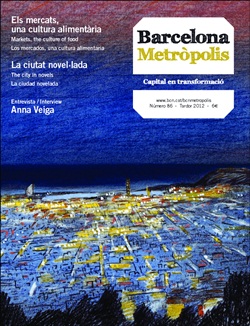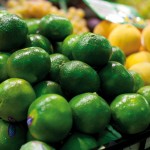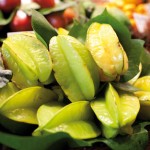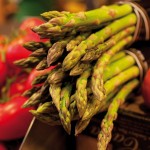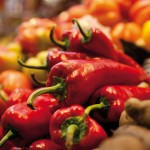Nothing better illustrates the landscape of a country and the way of life of its population than its market stalls. A trip to the market is akin to a visit to an art gallery, arousing and engaging all the senses. A culture loses its roots once people stop eating regional dishes.
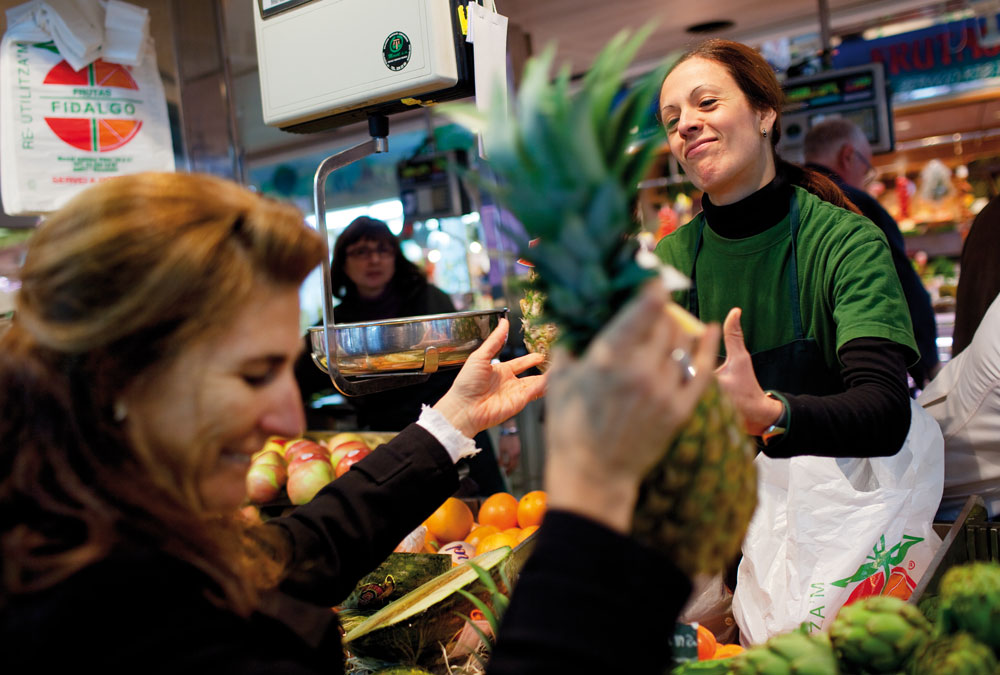
© Enrique Marco
Galvany market (Barcelona). The commercial transaction in a market is itself more human, with costumers treated not just as clients, but as individuals with a name and surname
According to the dictionary, a market is a place where all kinds of food are sold. While that is certainly true, this definition is somewhat lacking and hardly illustrative of what is actually to be found there. Going to the market is not just about buying food; we can do that in any store. In the market, food has that something extra, an added value, as it is called nowadays; it is food with a complement, like added vitamins. These “vitamins” give us as much life as vitamins B6, C and retinol all rolled into one.
The vitamin pills “gifted” by the market are: learning, making friends, looking after the planet, feeling part of a culture and filling our senses with colours, aromas and flavours. Thus, we don comfy shoes, take our basket or trolley and head for the marketplace. If we have children, we encourage them to come with us and look upon it as an outing, like going to the funfair or doing their favourite sport: one that we all learn from.
We walk into the market feeling restless and curious. We keep our ears, eyes and mouth wide open, the winds of knowledge breezing over all doubt and allowing us to taste the unknown. The market is the university of taste, and the professors, in their white, blue or frilly gowns, do not carry books, but rather pork ribs, bags of onions or enormous hakes. Therein lies the market’s wealth: we don’t just buy food; we also “buy” knowledge.
The professors of this useful university are butchers, fishmongers, greengrocers, charcutiers… They are not sellers; they are people with a trade, veritable specialists in their fields. We can ask them anything, because each one is all-knowing in their own subject: the best cut, where it came from, how to preserve it, what to combine it with – they will even give us a free recipe, conceived especially for the food item we have bought and to suit our own particular tastes. Bad business for those of us who write recipe books!
If we go there with the kids, we let them participate in decision-making and take their opinion into account. We don’t ask them to behave like adults; quite the opposite: it is we who have to become children for a while and enjoy the visit to the market, as if it were a game. Playing is a good way of learning: let’s see who’ll be the first to find a vegetable that looks like a clown’s nose! Ask the greengrocer if she has coll de dama figs… Count the change properly, and if you get it right I’ll give you five cents. Today it’s your turn to choose the cheese for the family’s lunch. Isn’t this fish really ugly? Well it’s monkfish, your favourite!
If you are feeling really playful, give them a few euros – particularly if they are with other children – and let them roam around the market for a while to buy whatever takes their fancy. But within certain limits: it has to be a vegetable, or more than one kind of food… or whatever you think is best. They have to have a watch and you show them where they must be at the appointed time. They will learn to get about, understand the value of money and tell the time!
When we shop at the market, it is not just we who benefit from the personal touch or get a specific recipe for what we buy. When we shop at the market, we also help the planet, and the social and commercial fabric of the neighbourhood, city and country into the bargain.
Markets sell loose produce, so they use less plastic, polystyrene, tins and cans. Moreover, shoppers often remember to bring their own baskets and cut down on the use of plastic bags. Shopping at the market is the most sustainable form of shopping for our beleaguered planet, which we have to take good care of. On the subject of improving the commercial fabric of our locality, we should remember that a market’s organisation is based on a group of small, independent traders who help to distribute the local capital fairly. Thus, shopping at the market is always the most equitable and sustainable kind of shopping.
Humanity and social values
At the market we are not just a number, we are not merely a customer; we are people, often addressed by our name or surname. Transactions are more personal. Before the inevitable “What would you like?”, we have probably already been asked about our family, our daily ups and downs and our health. Our relationship with and trust in the fishmonger, butcher, charcutier, greengrocer, and so forth, is cemented over the years and creates a link that goes beyond plain old buying and selling.
Unlike other commercial models, at the market there are no single-line queues, but rather a throng of people waiting to be served. People wait their turn in an orderly manner even though there seems to be no physical organisation. The protocol that establishes the order is the question “Who’s last?” No numbered tickets are needed; those are the magic words.
People make friends in the queues, greet each other and exchange gossip and recipes. It’s like encountering a psychologist, a tabloid journalist and a chef all at once. Everyone has their opinion and slant on things, and people talk freely and with impunity, because the subject matter is never of any real substance… It is like a social or thematic network, but not at all virtual; it is for real and connects people with the same interests: eating well and learning the secrets of good cooking.
A market is a reflection of how a country eats. And the way people eat is one of the most characteristic and defining traits of a culture’s personality. That explains why, when we travel, we like to visit the local markets. We like markets that resemble those of our own culture, and are surprised at those of exotic, far-off countries, where we discover unusual ingredients, get a whiff of pungent aromas of spices and look on in astonishment at the peculiar ways of eating. Nothing depicts the landscape of a country and the personality of its inhabitants better than its market stalls.
They say that a culture has lost its roots when its people stop eating the dishes of the land. According to the scholars of the history of immigration, the first generation born in the receiving country loses the way it dresses, the second loses the language and by the third generation the cooking has fused with the local cuisine. This is what happened in France, now into the fourth generation of Maghreb Arabs born there, and where couscous is now a staple in all French households.
We love travelling, but it is always that special dish of our own that makes us realise that we are truly back home. The market, and its idiosyncrasy, makes us feel part of this culture.
The senses awaken
Going to the market is like visiting an art gallery, where all our senses awake and participate, like a funfair, an adventure for all our senses – sight, smell, touch, taste and hearing.
The coloured array of the stalls is like a painting class where we learn all the hues of the Pantone chart. At the fishmonger’s we will act like doctors and examine the fish to make sure it is fresh. We will check that its eyes are bright, its gills blood-red and the scales viscous.
We will know that we are approaching the greengrocer’s thanks to the fragrant strawberries in spring, which is when they are at their best. The grocer will let us touch the melons, and will explain that they are ripe when they give a little under the pressure of our fingers.
We will enjoy the hubbub that defines the market, and savour the cheese samples from the charcutier.
In a nutshell, the market helps to consolidate culture, build a country and provide a healthy education. The market is the school that nurtures us.



